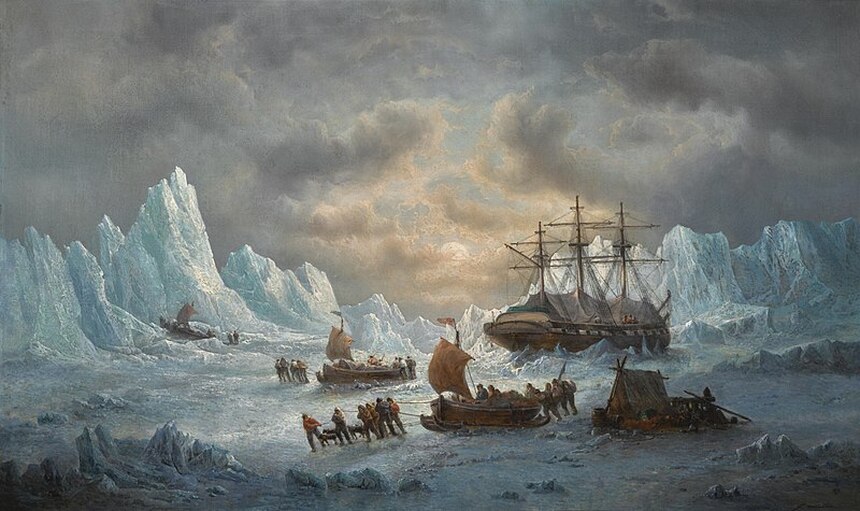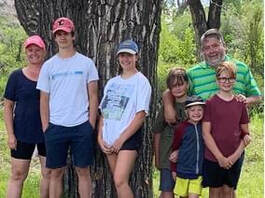|
It all started with a ghostly face peering through the melting permafrost of an exhumed grave located in the Canadian arctic, the face of John Torrington. I saw his picture for the first time while reading, Frozen in Time: The Fate of the Franklin Expedition by Owen Beattie and John Gieger when I was studying in university. John was a member of the doomed Franklin Expedition, sent by the Royal Navy in 1845 to find a passage through Canada’s arctic to the Far East, bringing glory and riches to the British Empire. The expedition ended in catastrophe, all 129 men dying due to a mix of disease, malnutrition, scurvy, starvation, and accidental poisoning. The human drama of the Franklin Expedition has fascinated me for most of my life, and as I’ve gotten older the thought of these men, and the suffering they must have endured has only tugged at my heart more fully. I’ve been a consumer of Catholic literature for years, both fiction and non-fiction, so when I decided to challenge myself to write a novel it was clear to me that Catholic themes would be at the heart of the story that I would tell. I just needed to come up with the story! As a husband and father of five kids, I thought about sharing my family experiences, to write about what I know most intimately, but the pull of writing a story, a novel, was more powerful. Then I thought of that face! Writing a novel was a “bucket list” thing for me. I wanted to discover if I had what it takes to write a full book, one good enough to get published. I also dreamed of looking at my bookshelf and seeing a spine looking back at me with my name on it! I’ve always loved reading, I consume books constantly, both novels, mostly historical fiction, but also every new Stephen King creation that is released, as well as non-fiction works of history. As the aforementioned Mr. King calls his fans, I am definitely a constant reader! So, I would write a novel about the Franklin Expedition, but it would have Catholic themes embedded throughout it. In planning the book, I decided to focus on characters, because that is where much of the mystery of the event lies. Most of the expedition’s sailors are little known to history, so I could create backstories for them and imagine plausible events during their time stuck in the ice. I picked four names off the crew list and attached them to four basic personalities of fellow teachers I work with at St. Joseph Collegiate and worship with at St. Mary’s here in Brooks. Then, I imagined they were the last four survivors, living their last eight days at Starvation Cove, the most southerly point the crew advanced during their desperate death march south in search of deliverance, hence the name of the novel. I imagined their physical decline and what they must have had to endure as they slowly succumbed to the harsh arctic elements. I also thought about the spiritual reckoning they inevitably faced, and that is where our Catholic faith would become part of the story. So many people, even my own teenaged children, ask me questions about God and His Church. They ask why bad things happen to good people. Why evil can exist in a world created by God. Why Christians can seem so indifferent to suffering, or even worse, be the cause of suffering. In the novel, the main character struggles with these questions his entire life. This character is Joseph Andrews, a real crew member of the expedition, a name I took off the actual crew list. It is also the name of my oldest son, Joseph Andrew. The character is a good man, honest, forthright, charitable, but disturbed at the hypocrisy he sees in the world. Disturbed by people who say one thing but do another. Before he dies, he finds some heavenly answers to these questions, allowing him to be at peace with his past and hopeful for eternity. Catholic fiction can be a powerful tool for evangelization. It has been for me. A story written that can inspire the reader in their faith is a gift indeed. I have been blessed to read all the novels of Michael O’Brien over the years, arguably Canada’s greatest Catholic novelist and author of Father Elijah: An Apocalypse, among other great works. Every time I read one of his books, my faith deepens. The publisher of Starvation Cove, Ottawa’s Justin Press, is closely associated with Michael O’Brien and has published several of his works. I could not be more honoured to be associated with such authentically faithful people, people who have impacted my own Catholic faith so fundamentally. I was speaking to a friend the other day who has read Starvation Cove. She is fellow teacher at St. Joseph’s and parishioner at St. Mary’s. I had asked her a few weeks ago what her favorite part of the book was, and she had a difficult time answering the question. She said she had indeed enjoyed the book, had read it quickly, but there was something about it that she needed to think about and would get back to me when she could more clearly articulate what she wanted to share. She approached me and recounted that it had finally come to her. She shared that what she most liked about Starvation Cove is that the character of Joseph Andrews reminded her of her husband. A good man, a great man actually, who struggles with his faith. Her husband is looking forward to reading the novel. With God’s grace, I pray that Starvation Cove may inspire this man as works of Catholic fiction have inspired me throughout my life. I’m looking forward to listening to what he has to say when he’s done.
1 Comment
9/20/2022 11:04:00 am
What a fascinating premise for a book! I just ordered it and look forward to reading it. Thanks for sharing through the diocesan website.
Reply
Your comment will be posted after it is approved.
Leave a Reply. |
Author
Catholic Pastoral Centre Staff and Guest Writers Archives
July 2024
Categories
All
|


 RSS Feed
RSS Feed